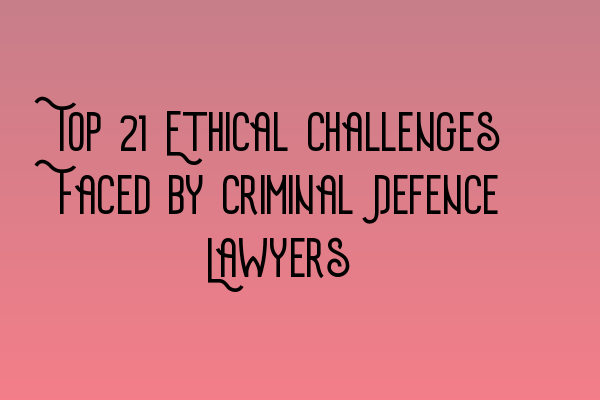Top 10 Ethical Challenges Faced by Criminal Defence Lawyers
Criminal defence lawyers play a crucial role in the justice system. They are responsible for defending the rights and interests of individuals accused of crimes. However, this role comes with numerous ethical challenges that require careful consideration and adherence to professional standards. In this article, we will discuss the top 10 ethical challenges faced by criminal defence lawyers.
1. Confidentiality
Confidentiality is a cornerstone of the lawyer-client relationship. Criminal defence lawyers must maintain the confidentiality of their clients’ information, even when faced with pressure from authorities or other parties. Failure to uphold confidentiality can undermine the trust between lawyers and clients, jeopardizing the client’s case. To learn more about the importance of confidentiality in legal practice, read our SQE 1 Practice Exam Questions article.
2. Conflict of Interest
Criminal defence lawyers often face situations where their personal or professional interests may conflict with their duty to provide effective representation. Managing conflicts of interest is essential to ensure unbiased and zealous advocacy. Our SQE 1 Practice Mocks FLK1 FLK2 article provides comprehensive guidance on identifying and resolving conflicts of interest.
3. Client Candor
Defence lawyers rely on their clients’ complete and truthful disclosure of information to build an effective defence strategy. Encouraging client candor can be challenging, particularly when clients may be hesitant to reveal crucial details. Developing strong communication skills and creating a safe space for clients to express themselves is vital for criminal defence lawyers. For tips on fostering open communication, check out our SQE 2 Preparation Courses.
4. Zealous Representation
Defence lawyers are obligated to provide zealous representation, advocating vigorously for their clients within the bounds of the law. However, this ethical duty can create tension when lawyers must balance their duty to the client with obligations to the court, justice system, and society as a whole. Understanding the limits of zealous representation is crucial for criminal defence lawyers. For more information, our SQE 1 Preparation Courses provide in-depth guidance.
5. Truthfulness in Advocacy
Criminal defence lawyers must navigate the delicate balance between advancing their clients’ interests and maintaining integrity in the legal process. While they have a duty to present their clients’ case in the best light, they must also be honest and truthful in their advocacy. Our article on SRA SQE Exam Dates explores the importance of truthful advocacy in legal practice.
6. Duty to the Court
Defence lawyers have a duty to the court to ensure the fair administration of justice. This duty includes refraining from facilitating or participating in dishonest or misleading practices. Upholding the duty to the court while vigorously representing clients can be challenging, requiring lawyers to navigate ethical dilemmas carefully. For guidance on fulfilling this duty, our SRA SQE Exam Dates article offers valuable insights.
7. Professional Independence
Professional independence is crucial for criminal defence lawyers to advocate for their clients effectively. They must be free from external pressures or conflicts that could compromise their professional judgment. Maintaining professional independence is essential to uphold the client’s best interests. For further information on professional independence, read our SQE 1 Practice Exam Questions.
8. Billing Practices
Ethical billing practices are essential for maintaining transparency and trust between lawyers and clients. Criminal defence lawyers should ensure their billing practices are fair, reasonable, and accurately reflect the services provided. Any potential conflicts of interest or overbilling should be avoided to uphold professional ethics. For guidance on ethical billing, consult our SQE 1 Practice Mocks FLK1 FLK2.
9. Professional Competence
Criminal defence lawyers have a duty to continuously improve and maintain their professional competence. Staying updated with legal developments, attending relevant training programs, and engaging in ongoing education are essential for providing effective representation. Our SQE 2 Preparation Courses can help lawyers enhance their professional competence.
10. Dealing with Difficult Clients
Criminal defence lawyers often encounter challenging clients who may have difficult personalities or unrealistic expectations. Lawyers must navigate these dynamics while providing competent and ethical representation. Developing effective strategies for managing difficult clients is crucial for maintaining professionalism and ensuring ethical compliance. For guidance on handling difficult clients, we recommend our SRA SQE Exam Dates article.
As criminal defence lawyers face numerous ethical challenges in their profession, it is crucial to stay informed, seek guidance, and prioritize ethical conduct. By addressing these challenges with professionalism and integrity, lawyers can fulfill their duty to their clients, the court, and the justice system.
